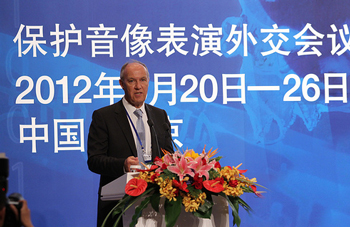WIPO Beijing Treaty on Audiovisual Performances
 Op 26 juni 2012 is het Beijing Treaty on Audiovisual Performances gesloten.
Op 26 juni 2012 is het Beijing Treaty on Audiovisual Performances gesloten.
The diplomatic conference to finalize a new treaty for audiovisual performers was successfully concluded on June 26, 2012 as negotiators from WIPO’s member states signed the Beijing Treaty on Audiovisual Performances– so-named in recognition of the city that hosted the final round of negotiations. The new treaty brings audiovisual performers into the fold of the international copyright framework in a comprehensive way, for the first time.
The Beijing Treaty on Audiovisual Performances (BTAP) will strengthen the economic rights of film actors and other performers and could provide extra income from their work. It will potentially enable performers to share proceeds with producers for revenues generated internationally by audiovisual productions. It will also grant performers moral rights to prevent lack of attribution or distortion of their performances.
Importantly, the new treaty will strengthen the precarious position of performers in the audiovisual industry by providing a clearer international legal framework for their protection. For the first time it will provide performers with protection in the digital environment. The treaty will also contribute to safeguarding the rights of performers against the unauthorized use of their performances in audiovisual media, such as television, film and video.
The Diplomatic Conference was attended by 156 member states, 6 intergovernmental organizations and 45 non-governmental organizations. This is the highest level of participation ever at a WIPO Diplomatic Conference. 122 countries signed the Final Act of the treaty, and 48 countries have signed the treaty itself.
The treaty will enter into force once it has been ratified by 30 eligible parties, including countries or certain intergovernmental organizations.
Signature of the treaty constitutes a preliminary endorsement by demonstrating the state’s intent to examine the treaty domestically and consider ratification, though signing does not create a binding legal obligation to ratify.
Lees het volledige persbericht hier.

























































































